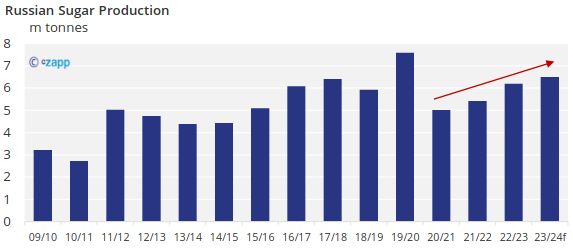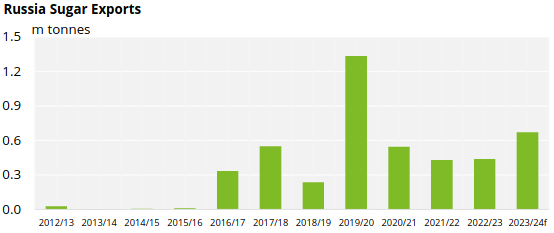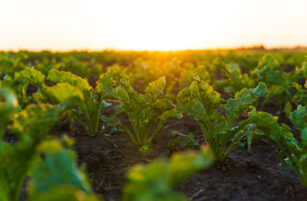Insight Focus
- Russia will produce at least 6.5m tonnes sugar this year.
- This means Russia has excess sugar that can be exported into the region.
- Russia is also aiming to increase its self-sufficiency in beet seeds.
Russian Sugar Production Rises for 3rd Consecutive Year
Russia is one of the world’s largest beet sugar producers. It usually makes a small surplus of sugar which is then exported to friendly neighbouring countries.
This year’s beet yields have been almost 10% higher than last year’s following excellent weather conditions. Heavy rain is now complicating the tail of the beet harvest in some regions, but nevertheless, with harvesting more than 90% complete we think Russia will make at least 6.5m tonnes of sugar, up from 6.2m tonnes last year.

Russia consumes around 5.8m tonnes of sugar each year. This means this year there’s around 700k tonnes surplus available to export.
Russia Finds New Export Markets
Russia typically exports sugar by rail and road into Central Asia. These flows will continue this year, notably to Kazakhstan and Uzbekistan by rail.
Low rail wagon availability has also led to an increase in truck movements, and Russia has been able to carve open some interesting new export opportunities.

We’ve heard reports of Russian sugar being exported to Afghanistan, taking advantage of the cessation of sugar exports from India and Pakistan. We’ve also heard rumours of truck movements of sugar from Russia to Serbia, potentially taking a long route via Belarus, Poland, Slovakia, and Hungary given that transiting Ukraine isn’t possible.
Since August, at least 130k tonnes of sugar has been exported; we expect exports to continue into 2024. Exports of sugar by containers from Black Sea ports remain prohibitively expensive, though, and so we are unlikely to see Russian whites move further afield even though world market sugar prices remain high.
Russia Remains Dependent on Seed Imports
Russia continues to direct state investment into agriculture in an attempt to increase self-sufficiency in major foods. While Russia is a major food growing country, it remains dependent on imports for seeds of almost all major crops; many of these imports come from states Russia deems unfriendly.
Sugar beet is a particular problem. When Russia invaded Ukraine in 2022 it sourced more than 95% of its beet seeds from overseas. This import dependence hasn’t improved much in the intervening years.
However, Russia is slowly becoming more assertive. It’s now aiming for 75% of beet seeds to be of domestic origin by 2028. Russia also recently prohibited beet seed arrivals from German and Danish suppliers after those suppliers didn’t respond to requests for audits of their facilities. Russia claims beet seeds imported from those suppliers contained “quarantined objects dangerous to Russian agriculture”.
Nevertheless, we expect Russia to continue to produce a domestic surplus of sugar for the foreseeable future.














